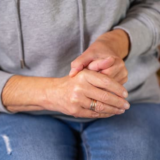Projects we’re funding
- TEXT4myBACK – text message intervention to improve function in people with low back pain
- What guidance do people seek when considering stem cell therapy for musculoskeletal conditions
- Got Your Back – What resources and supports do people with non-work related back pain need to help them at work
- Prognostic tool to support decision making for total joint replacement
TEXT4myBACK – text message intervention to improve function in people with low back pain
Chief investigator: A/Prof Manuela Ferreira, A/Prof Paulo Ferreira, Prof Andrew McLachlan, Prof Clara Chow, A/Prof Julie Redfern, Ornella Clavisi, Lisa Bywaters, Joanna Prior, Giovana Vesentini
Institutions: George Institute, University of Sydney, Musculoskeletal Australia
Project timeline: 2018-2020
More about the project…
TEXT4myBACK aims to test the effects of a lifestyle-focused self-management text message program for people with low back pain. It is an innovative study using text messages to support recovery of people suffering from low back pain. Participants will receive test messages in different formats.
The study team is currently recruiting!
If you have low back pain and would like to participate, please follow the link to find out more! http://bit.ly/TEXT4myBACK. Or watch the video with information about the study.
What guidance do people seek when considering stem cell therapy for musculoskeletal conditions
Chief investigator: Associate Professor Megan Munsie and Dr Claire Tanner
Institutions: Centre for Stem Cell Systems, University of Melbourne
Project timeline: 2018 -2019
More about the project…
Each year hundreds of Australians are contemplating undertaking, or have undertaken, purported stem cell treatments for a musculoskeletal condition or to alleviate joint pain and/or restore musculoskeletal health. Many are pursuing these unproven interventions outside clinical trials. Little is known about how they reach their decision and what information if any they draw upon.
This project aims to gain a greater understanding of the experiences, views and practices of consumers who have sought information or contemplated undergoing stem cell treatments for musculoskeletal conditions. The study will also explore the views of consumer advocacy groups regarding the type of guidance they give to consumers who are contemplating stem cell therapy.
This project is currently recruiting participants. To find out more or to register you interest, call Gabriel on 0452 390 530 or send an email to glirios@student.unimelb.edu.au.
Got Your Back – What resources and supports do people with non-work related back pain need to help them at work
Chief investigator: A/Prof Jodi Oakman, Natasha Kinsman
Institution: La Trobe University
Project timeline: 2018-2019
More about the project…
The overall aim of this project is to develop an online tool kit to support people with musculoskeletal conditions who are struggling with work. The aim is for the tool kit to be practical (think ‘your rights at work’, how to explain pain to your boss, fitting in with colleagues, juggling the rest of life).
This research relates to the first stage of the project which will explore the needs of people with non-work related back pain who are struggling at work as a result of their condition. The research will involve interviewing people with non-work-related back pain to identify:
- What resources and supports do people with non-work-related back pain need to help them with work?
- How should resources to support people with non-work-related back pain be provided, implemented and communicated?
- What strategies and resources are required to assist people to communicate with their employer so that they can assist them to manage at work?
This project is currently recruiting participants. To find out more or to register you interest, click here.
Prognostic tool to support decision making for total joint replacement
Chief investigator: A/Prof Michelle Dowsey, Prof Peter Choong, Prof Anthony Scott, Prof Philip Clarke, Doctor Tim Spelman, Prof David, Hunter, A/Prof Simon French, Dr Samantha Bunzil
Institution: The University of Melbourne
Project timeline: 2018-2021
More about the project…
Deciding who is likely to benefit from total knee replacement surgery (TKR) and who is not, presents a challenge for Orthopaedic Surgeons. Currently, decisions on who is a good candidate relies on clinical judgment which can vary from surgeon to surgeon. While there is agreement that pain severity and extent of disease are key considerations for judging whether a patient is appropriate for TKR; other indicators, which have been shown to predict poor outcomes, such as obesity and mental wellbeing are not consistently used. Consideration for these two factors have been shown to be important as patients who are deemed inappropriate candidates using these criteria, are less likely to achieve a good outcome from TKR surgery.
This study will test a decision support tool for orthopaedic surgeons to assist them in their decision making for recommending TKR surgery and identifying which patients are more likely to benefit from surgery.














